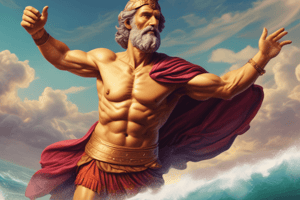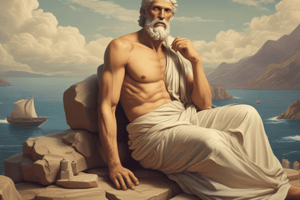Podcast
Questions and Answers
What significant event triggered the Trojan War?
What significant event triggered the Trojan War?
- The siege of Troy by Agamemnon
- A dispute among the gods over beauty
- The alliance of Greek city-states against Troy
- The abduction of Helen by Paris (correct)
Which character's actions ultimately lead to a plague afflicting the Greeks?
Which character's actions ultimately lead to a plague afflicting the Greeks?
- Agamemnon's dishonor of Achilles (correct)
- Hector's refusal to fight
- Paris' challenge to Menelaus
- Achilles' withdrawal from battle
What role did Eris play in the events leading up to the Trojan War?
What role did Eris play in the events leading up to the Trojan War?
- She threw a golden apple to incite rivalry (correct)
- She cursed the Trojans
- She aided Achilles in battle
- She brokered peace between the Greeks and Trojans
Who ultimately judged the beauty contest between Hera, Athena, and Aphrodite?
Who ultimately judged the beauty contest between Hera, Athena, and Aphrodite?
What event led to Patroclus' death during the Trojan War?
What event led to Patroclus' death during the Trojan War?
What was the outcome of Achilles' revenge against Hector?
What was the outcome of Achilles' revenge against Hector?
What was the reaction of Achilles regarding Hector's body after his death?
What was the reaction of Achilles regarding Hector's body after his death?
Which theme is NOT a significant focus in The Iliad?
Which theme is NOT a significant focus in The Iliad?
Flashcards are hidden until you start studying
Study Notes
The Iliad Overview
- Composed in ancient ionic language, part of the Greek epic genre.
- Considered one of the greatest literary achievements in Western literature.
- Key themes include love, honor, friendship, rivalry, free will, and fate.
Homer
- Attributed author of The Iliad and The Odyssey, active around the 8th century B.C.
- His life is shrouded in legends; little is known for certain.
- Represents the embodiment of ancient Greek culture, preserving fables and tales.
The Influence of Eris
- Zeus hosted a wedding for Peleus and Thetis but excluded Eris, the goddess of Chaos.
- Eris threw a golden apple labeled "for the most beautiful," sparking a rivalry among Hera, Athena, and Aphrodite.
- Paris of Troy was chosen to judge beauty; he awarded the apple to Aphrodite in exchange for the love of Helen.
The Siege of Troy
- Helen, married to Menelaus, was taken by Paris, leading Menelaus and his brother Agamemnon to assemble a Greek army.
- The ten-year siege resulted in stalemate, with Hector leading the Trojans against the Greeks.
Achilles and Agamemnon's Conflict
- Achilles, a crucial Greek warrior, captured Chryse and enslaved its people, including Astynome.
- Agamemnon demanded Astynome and refused ransom, provoking Apollo's wrath and a deadly plague against the Greeks.
- Achilles withdrew from battle after Agamemnon dishonored him by seizing Briseis.
Divine Interventions
- The gods were involved in human affairs, with Zeus influencing battles.
- Menelaus challenged Paris to a duel, which ended in Paris escaping with Aphrodite’s help.
- Athena instigated a breach of the truce by convincing Pandarus to injure Menelaus.
Patroclus' Death
- Achilles’ best friend, Patroclus, donned Achilles' armor to lead the Greeks, killing many Trojans, including Sarpedon.
- Apollo aided Hector in defeating Patroclus, who foretold Hector’s doom with his last breath.
Achilles' Revenge
- In a fury after Patroclus' death, Achilles sought revenge against Hector.
- The gods stood apart during the battle, maintaining their own allegiances.
- Achilles defeated Hector after a dramatic chase around Troy, leading to Hector's death and subsequent dishonor.
The Fate of Hector
- Achilles refused to return Hector's body until King Priam personally begged for it, invoking shared paternal grief.
- Hector's funeral was marked by mourning and rituals, concluding the original epic.
Legacy
- The Iliad ends with Hector's death; later stories, including Virgil’s Aeneid, expands on events like the Trojan Horse and Achilles' demise.
- Continuation of the story beyond The Iliad reflects the lasting impact of the narrative in literary history.
The Iliad Overview
- Composed in ancient Ionic dialect; regarded as a pinnacle of Western literature.
- Central themes explore love, honor, friendship, rivalry, and the concepts of free will and fate.
Homer
- Traditionally credited with authorship of The Iliad and The Odyssey, active during the 8th century B.C.
- His historical existence is debated; his works encapsulate ancient Greek culture and mythology.
The Influence of Eris
- In a wedding hosted by Zeus for Peleus and Thetis, Eris, the goddess of Chaos, was purposely omitted.
- Eris incited conflict by presenting a golden apple marked "for the most beautiful," leading to competition among Hera, Athena, and Aphrodite.
- Paris of Troy judged this contest, awarding the apple to Aphrodite, who promised him the love of Helen, igniting the Trojan War.
The Siege of Troy
- Helen's abduction by Paris, despite her marriage to Menelaus, provoked a Greek response led by Agamemnon and Menelaus.
- A protracted ten-year siege ensued, characterized by a deadlock with Hector spearheading Trojan defense.
Achilles and Agamemnon's Conflict
- Achilles played a vital role as a warrior; his actions began with the conquest of Chryse and the enslavement of its inhabitants.
- Agamemnon's refusal of a ransom and dishonor towards Achilles triggered Apollo's wrath, resulting in a plague among the Greeks.
- Achilles’ anger led him to withdraw from combat following Agamemnon's seizure of Briseis, his war prize.
Divine Interventions
- The narrative features significant divine involvement, with Zeus actively swaying battle outcomes.
- In a duel, Menelaus faced Paris, who narrowly escaped thanks to Aphrodite's intervention.
- Athena manipulated events by persuading Pandarus to break a truce, further escalating the conflict.
Patroclus' Death
- Patroclus, Achilles' beloved companion, donned Achilles' armor, launching a deadly assault on the Trojans, including Sarpedon.
- Apollo supported Hector against Patroclus, leading to Patroclus' demise; he prophesied Hector's fate as he died.
Achilles' Revenge
- Grief-stricken and enraged by Patroclus' death, Achilles vowed to avenge him against Hector.
- The gods maintained neutrality during their confrontation, reflecting their divided loyalties.
- After an intense pursuit, Achilles killed Hector, ensuring his dishonor by refusing to return his body.
The Fate of Hector
- Achilles ultimately relented to return Hector's body only after an emotional plea from King Priam, underscoring themes of shared suffering.
- Hector's funeral was a poignant affair, marked by a solemn atmosphere and elaborate rituals, concluding The Iliad’s narrative.
Legacy
- The Iliad concludes with Hector's demise; subsequent narratives, including Virgil’s Aeneid, elaborate on the aftermath, such as the Trojan Horse and Achilles' fate.
- The enduring legacy of The Iliad is evident in its profound influence on literature and storytelling throughout history.
Studying That Suits You
Use AI to generate personalized quizzes and flashcards to suit your learning preferences.




